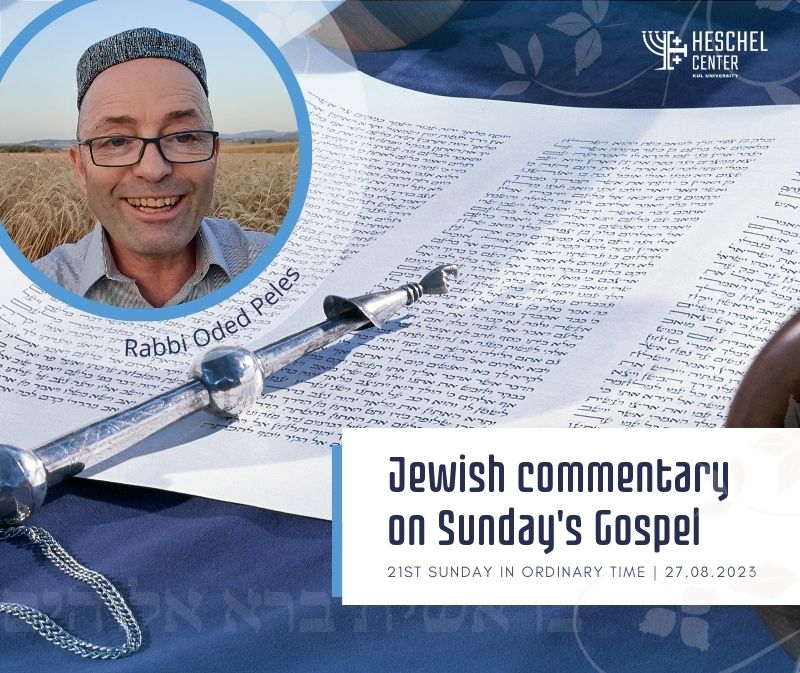Ties bound on earth and in heaven
 Ties between God and His people are the focus of the ongoing Jewish month of Elul. It is a time of renewing relationships with God and His special presence. To establish a bond with heaven, however, one must first mend ties with one’s neighbors, writes Rabbi Oded Peles, a Jewish cantor, and Israeli educator who looks at the words of the Gospel of Sunday, August 27, from the perspective of Jewish faith and tradition, in a commentary for Heschel Center of the Catholic University of Lublin.
Ties between God and His people are the focus of the ongoing Jewish month of Elul. It is a time of renewing relationships with God and His special presence. To establish a bond with heaven, however, one must first mend ties with one’s neighbors, writes Rabbi Oded Peles, a Jewish cantor, and Israeli educator who looks at the words of the Gospel of Sunday, August 27, from the perspective of Jewish faith and tradition, in a commentary for Heschel Center of the Catholic University of Lublin.
Commenting on Jesus’ words from the Gospel of Matthew,” Whatever you bind on earth shall be bound in heaven, and whatever you loose on earth shall be loosed in heaven” (Matthew 18:18), Rabbi Peles relates them to the ongoing Jewish month of Elul, whose central theme is precisely the relationship and bond between heaven and earth.
This final month in the Jewish calendar is a time of mercy and forgiveness. Preceding the major Jewish holidays - Rosh ha-Shanah (the Jewish New Year) and Yom Kippur (the Day of Atonement) - the month of Elul is a unique opportunity to draw closer to God and to strengthen a loving relationship with Him. “It is no coincidence that Elul derives from the Song of Songs,” Rabbi Peles emphasizes, “an allegorical dialogue between the beloved and the beloved, a parable about God’s relationship with His people.”
As Oded Peles points out, the relationship with God, citing teachings from the Mishnah, depends on the relationship with people. “To establish a relationship with heaven, one must first repair the relationship with one’s neighbors,” stresses the Israeli rabbi, “The gates of heaven are wide open to our souls, and prayers are most effective when we make peace here on earth. Whatever we bind on earth will be bound in heaven, and whatever we untie on earth will be unbound in heaven (cf. Matt. 18:18).
We publish a full test of the commentary
The reading of the Gospel of Matthew chapter 16 verse 19, reminds us of Matthew 18, 18: "Amen, I say to you, whatever you bind on earth shall be bound in heaven, and whatever you loose on earth shall be loosed in heaven".
The relationships and the bond between heavens and earth is one of the main themes of the current Jewish month, the month of Elul. It is the last month of the Jewish calendar year, when the Jewish world is getting ready and preparing for the High Holidays: Rosh-ha-Shanna, the Jewish New Year is when we mark the creation of the world and reaffirm God’s sovereignty upon the world.
Ten days later, we celebrate Yom Kippur, the Day of Atonement, when we pray and ask of God almighty to forgive our sins and to inscribe us in the "Book of Life".
The Kabbalah scholars teach us that the meaning of the month of Elul derives from the verse: " I belong to my lover, and my lover belongs to me" (Song of Songs 6, 2). Song of Songs is an allegorical dialogue between the lover and the beloved. A parable for the relationships between God and his Nation.
The month of Elul is a month of mercy and forgiveness. It is the time when Moses went up Mount Sinai for the third time to meet God and to plead for forgiveness for the sins of the Israelites. It is a time of a unique opportunity to come closer and become more intimate with God, to enhance our relationship with him and it is also a perfect chance to repent our sins.
Furthermore, the sages teach us and encourage us to reach God. It is a time for a closer bond between the holy and the earthly. A time of year when there is more of an open passage and free flow between heaven and earth.
"The king is present in the fields" the Hassidic scholars teach us. Unlike most of the year, during these very days, God our sovereign, is plainly walking amongst us. He is much closer, reachable, approachable and seeking our closeness. As the prophet Isaiah calls: "Seek the LORD while he may be found, call upon him while he is near" (55, 6).
However, this unique relationship and openness come with a condition. The Mishnah teaches us: "However, for sins between one person and another, Yom Kippur does not atone until the guilty one appeases the other person" (Yomah 8, 9). In order to bond with the heavens, we should first bond with our fellow human beings here on earth. Day of Atonement, the day when heaven's gates are widely open towards our souls and prayers, is most effective once we have made peace here on earth.
About the Author
Rabbi Oded Peles - cantor, musicologist, Israeli educator and tour guide. Oded Peles was born in Petach Tikva, Israel to a Dutch-German Jewish family. Following in the footsteps of his grandfather, a renowned cantor of the Rotterdam synagogue, the Netherlands, Oded has served and performed as a Cantor in communities worldwide, for over thirty years.
Centrum Heschela KUL












